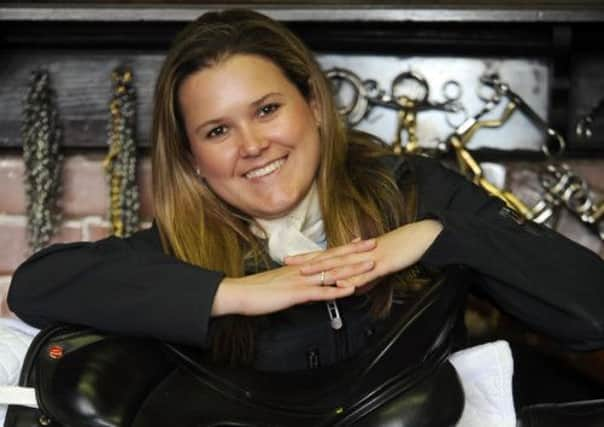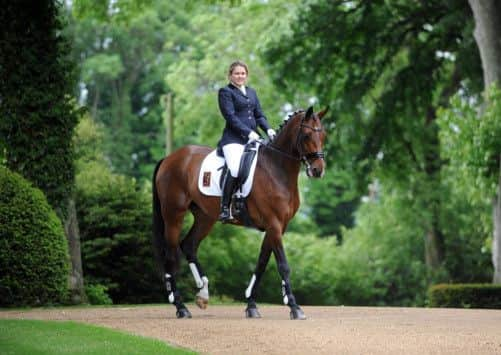Making a business out of good breeding


Nestled in a fold in the rolling hills above Thirsk, a herd of horses and their foals graze in beautifully manicured paddocks in the shadow of a graceful 16th-century country house.
In many ways they present the perfect picture of traditional country life, but they are also the foundation of a brand new business proposition being run by one of Yorkshire’s youngest entrepreneurs – 26-year-old Emma Blundell.
Advertisement
Hide AdAdvertisement
Hide AdThe foals, descended from the finest bloodlines using equine IVF, are being bred to take part in the sport of dressage which is currently dominated by the Great Britain squad who secured team and individual gold medals at last year’s London Olympics. In an industry where buyers traditionally go Germany or Holland to buy, and elite competition horses can cost millions of pounds, Emma hopes to put Britain firmly on the map.


“I suppose you could call me obsessive, but when I have an idea I want to be across every little detail, so I wanted to do everything properly and set up on a proper business footing,” says Emma, who has established her stud in the grounds of her parents’ house, inhabiting the 17th-century stable block and adding a range of state of the art stabling.
Her theory is simple: Breed from the very best mares who have proved themselves in top level competition, using frozen or chilled semen from the world’s top stallions. Many of the mares on the stud then have their embryos transplanted into a surrogate mare, so they can carry on competing, and by winning, enhance the value of her progeny.
The stud will sell all the colt (male) foals when they are weaned from their mothers, and the income will go back into the business. The fillies, initially, will be kept and produced for competition in the hope they will be good enough to found dynasties themselves.
Advertisement
Hide AdAdvertisement
Hide Ad“The germ of the idea came when I had two mares which I’d done some competing on myself but which had suffered minor injuries. I wondered about breeding from them,” says Emma.
“I was at university at the time, doing my masters in business management, and I needed a subject for my dissertation. I managed to persuade my lecturer to let me do my research into equine reproduction and its impact on the future of horse sport, and then I had to come up with a business plan and a credible pitch.”
Her idea earned her a first class degree, but then she had to put it all into practice. She not only had to convince the bank to help underwrite a business proposition costing well over seven figures, but her father.
Emma’s entrepreneurial gene, probably comes from her father Chris, who is the nephew of Ken Morrison (of the eponymous supermarket chain). Chris worked in the family business as a director for many years, and has now helped create a growing group of gastro pubs called Providence Inns, an elite shooting enterprise and a successful farm. Her sister Averil has her own interior design business, and her two younger brothers are already nurturing business ideas.
Advertisement
Hide AdAdvertisement
Hide Ad“Convincing Dad was far harder than my pitch to the bank,” Emma remembers “His first words were ‘horses don’t make money’, but he eventually agreed I could develop the grounds, build barns, laboratories and facilities provided it was run as a proper business. With the bank onside I put together an investment plan which aims to see us making a return in six years.”
So, Mount St John Equestrian was born, with 40 surrogate mares, 20 foals so far this spring, and a select cadre of competition mares ridden by Emma and international dressage rider Anne-Marie Perry who is based up the road near Hartlepool. One of Emma’s horses, ridden by Anne-Marie is on the World Class Development Programme.
Emma’s involvement with horses was not inherited, but something she nagged her parents into letting her do.
“We used to pass the local riding school in Ilkley, and I could see the horses. I used to go on and on about learning to ride. Eventually my father relented, and when I was seven said I could have a lesson a fortnight. That became a lesson a week, and my sister got interested too. Eventually we were allowed our own pony and William arrived,” she recalls.
Advertisement
Hide AdAdvertisement
Hide AdThe two sisters became legends on the local show circuit, sharing William who could contest up to eight classes a day. When Averil grew taller a bigger pony was needed and Emma had William to herself to take on her sister in the same classes.
“My favourite story is when we were pulled in first and second and had to do individual shows for the judge. I set off very fast and when I turned the corner William slipped, I fell off and we both went slap into the mud. My clean grey pony was filthy and I had dirt all over, but the judge legged me back up and told me to finish my show. In the end, I was put into first place beating Averil who remained immaculate.”
Emma’s competitive instinct took her to the top of the showing world and over the following years she qualified for the Horse of the Year Show on several occasions, recruiting mum Jill into being chief caterer, horsebox driver and groom.
When she reached 15, Emma chose a renowned trainer called John Lassetter based in Sussex and used to spend school holidays working there.
Advertisement
Hide AdAdvertisement
Hide Ad“I wasn’t thinking I wanted to compete at first, just get better. But he was a dressage trainer and I gradually fell in love with the sport.”
Emma hatched an ambitious plan. Having never before competed in a dressage class, she decided she wanted to try for the Young Riders classes, which are at a high level and designed for people trying to get on the British team. She had to do this, before her 25th birthday, but sadly, it didn’t quite work out.
“I did get to ride at quite a high level but both my horses eventually had injuries, and I had to decide whether to concentrate on the riding or breeding. I chose breeding and spent long hours travelling across Europe and learning all I could from the very best experts, and I’m still constantly studying bloodlines and attending auctions viewing young stock from dawn to dusk, seeing what works in the market.”
Now she has established her breeding operation Emma has returned to competing on an expressive grey called Keystone Diaz and some young horses. But it is the stud which is her pride and joy. She has a staff of 10 at peak season, including internationally renowned vet Eric Klaui who has flown in from Australia for three months to oversee the operation.
Advertisement
Hide AdAdvertisement
Hide AdEric monitors the cycle of every mare to provide the optimum moment for fertilisation and then for transferring the developing embryo into the surrogate mare. Spreadsheets record plans for each animal and which stallion has been chosen. The lab and veterinary areas are immaculate and state of the art.
“It needs to be the whole package like any other business, with strategies for marketing, social media and PR which are so often forgotten in some horsey businesses,” says Emma whose attention to detail include staff jackets, a patriotically liveried horsebox in red white and blue with business logos, a brand new barn, maximum light and natural living conditions and beautiful presentation of everything she does.
Emma has already been asked to reserve one of this year’s foals for Emile Faurie, who has represented Great Britain at European, World and Olympic level. She also mentions that she’s had a call from Charlotte Dujardin, 2012 individual Olympic gold medallist, who may be interested in buying one of the foals.
“I know we can breed the very best – you may be looking at future world champions born here,” she says.
With Emma’s determination, you wouldn’t bet against it.